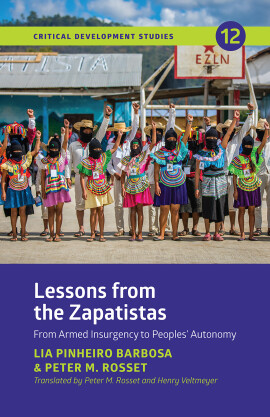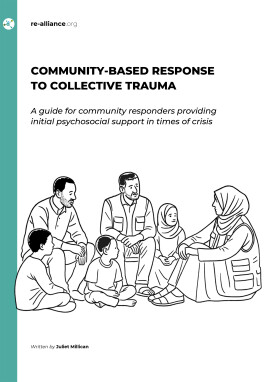
Development and Culture
Most development policies and interventions are based on an assumption that 'modernisation' in the Western sense is the ultimate goal of human societies. Culture is therefore regarded either as an impediment to progress or as something outside the economic and political spheres and consigned to areas of religion and ritual. This collection of papers, published in association with World Faiths Development Dialogue and written by a range of aid practitioners and scholars, shows the need not merely to view culture as an important dimension of development but to see development itself as a cultural expression and culture as the basis upon which societies can develop through self-renewal and growth.
Published: 2002
Pages: 220
eBook: 9780855986919
Paperback: 9780855984724
| Contributors | |||
|---|---|---|---|
| Preface | |||
| Cultures, spirituality, and development 1 | |||
| Culture, liberation, and 'development' 25 | |||
| Globalism and nationalism: which one is bad? 38 | |||
| Faith and economics in 'development': a bridge across the chasm? 45 | |||
| Spirituality: a development taboo 60 | |||
| Communal conflict, NGOs, and the power of religious symbols 78 | |||
| Ethnicity and participatory development methods in Botswana: some participants are to be seen and not heard 92 | |||
| Women, resistance, and development: a case study from Dangs, India 110 | |||
| Gendering the millennium: globalising women 130 | |||
| Stressed, depressed, or bewitched? A perspective on mental health, culture, and religion 142 | |||
| Responding to mental distress in the Third World: cultural imperialism or the struggle for synthesis? 155 | |||
| Research into local culture: implications for participatory development 168 | |||
| Some thoughts on gender and culture 174 | |||
| Resources 177 | |||
| Index 194 |
Deborah Eade Deborah Eade was Editor-in-Chief of Development in Practice from 1991 to 2010, prior to which she worked for 10 years in Latin America. She is now an independent writer on development and humanitarian issues, based near Geneva.
India's Culture
Notes and References
2009
https://doi.org/10.1093/acprof:oso/9780198060635.002.0019 [Citations: 0]Conceptualising disability in Ghana: implications for EFA and inclusive education
Anthony, Jane
International Journal of Inclusive Education, Vol. 15 (2011), Iss. 10 P.1073
https://doi.org/10.1080/13603116.2011.555062 [Citations: 76]Culture and food security: a case study of homestead food production in South Africa
Trefry, Amy
Parkins, John R.
Cundill, Georgina
Food Security, Vol. 6 (2014), Iss. 4 P.555
https://doi.org/10.1007/s12571-014-0362-4 [Citations: 29]India's Culture
Introduction
2009
https://doi.org/10.1093/acprof:oso/9780198060635.002.0020 [Citations: 0]Going Beyond
Heritage Conservation and Sustainable Development in Sacred Places: Towards a New Approach
Serafi, Sara Anas
Fouseki, Kalliopi
2017
https://doi.org/10.1007/978-3-319-57165-2_9 [Citations: 3]Mental Health Services in Low‐Income Countries: Challenges and Innovations
Fernando, Suman
International Journal of Migration, Health and Social Care, Vol. 1 (2005), Iss. 1 P.13
https://doi.org/10.1108/17479894200500003 [Citations: 0]India's Culture
The Monumental Challenge: The Role of the Archaeological Survey of India in India's Culture
2009
https://doi.org/10.1093/acprof:oso/9780198060635.005.0003 [Citations: 0]India's Culture
Copyright Page
2009
https://doi.org/10.1093/acprof:oso/9780198060635.002.0004 [Citations: 0]Agroforestry
Agroforestry Systems as Adaptation Measures for Sustainable Livelihoods and Socio-economic Development in the Sikkim Himalaya
Sharma, Ghanashyam
Sharma, Eklabya
2017
https://doi.org/10.1007/978-981-10-7650-3_8 [Citations: 11]Religious actors, civil society and the development agenda: The dynamics of inclusion and exclusion
McDuie‐Ra, Duncan
Rees, John A.
Journal of International Development, Vol. 22 (2010), Iss. 1 P.20
https://doi.org/10.1002/jid.1537 [Citations: 27]Faith Leaders and Child Well-Being in Bangladesh: An Empirical Study
Mostofa, Shafi Md
Siddiqui, Muhammad Sazzad Hossain
The Review of Faith & International Affairs, Vol. 22 (2024), Iss. 1 P.59
https://doi.org/10.1080/15570274.2024.2303286 [Citations: 1]India's Culture
State and Market in India's Culture
Singh, Balmiki Prasad
2009
https://doi.org/10.1093/acprof:oso/9780198060635.003.0002 [Citations: 0]Governmental donor agencies and faith-based organizations
Holenstein, Anne-Marie
International Review of the Red Cross, Vol. 87 (2005), Iss. 858 P.367
https://doi.org/10.1017/S1816383100181391 [Citations: 5]India's Culture
India's Culture: Some Facts, Some Perspectives
Singh, Balmiki Prasad
2009
https://doi.org/10.1093/acprof:oso/9780198060635.003.0001 [Citations: 0]Transnationalism and the Development of the Deterritorialised Tongan Nation‐State
Wallis, Joanne
Studies in Ethnicity and Nationalism, Vol. 8 (2008), Iss. 3 P.408
https://doi.org/10.1111/j.1754-9469.2008.00033.x [Citations: 3]The Challenge of Pluralism: Sarvodaya's Inclusive Approach to Development and Peacebuilding in Sri Lanka
Johnson, Noor
Journal of Peacebuilding & Development, Vol. 2 (2006), Iss. 3 P.93
https://doi.org/10.1080/15423166.2006.134861452662 [Citations: 2]India's Culture
Democracy, Ecology, and Culture: The Indian Experience
2009
https://doi.org/10.1093/acprof:oso/9780198060635.005.0004 [Citations: 0]India's Culture
Dedication
2009
https://doi.org/10.1093/acprof:oso/9780198060635.002.0005 [Citations: 0]Creative contributions: The role of the arts and the cultural sector in development
Stupples, Polly
Progress in Development Studies, Vol. 14 (2014), Iss. 2 P.115
https://doi.org/10.1177/1464993413517779 [Citations: 22]India's Culture
Foreword
2009
https://doi.org/10.1093/acprof:oso/9780198060635.002.0008 [Citations: 0]Promoting gender equality in the context of Nigerian cultural and religious expression: beyond increasing female access to education
Para‐Mallam, Funmi J.
Compare: A Journal of Comparative and International Education, Vol. 40 (2010), Iss. 4 P.459
https://doi.org/10.1080/03057925.2010.490370 [Citations: 17]India's Culture
Singh, Balmiki Prasad
2009
https://doi.org/10.1093/acprof:oso/9780198060635.001.0001 [Citations: 6]India's Culture
Culture and Administration: A Study of Interaction as a Means of Social Change in India
2009
https://doi.org/10.1093/acprof:oso/9780198060635.005.0001 [Citations: 0]Mayan and Catholic Spiritual Traditions
Tyndale, Wendy
Mountain Research and Development, Vol. 26 (2006), Iss. 4 P.315
https://doi.org/10.1659/0276-4741(2006)26[315:MACST]2.0.CO;2 [Citations: 0]India's Culture
Arts, Cultural Pageants and the State: The Nehru–Azad Dialogue
Singh, Balmiki Prasad
2009
https://doi.org/10.1093/acprof:oso/9780198060635.003.0003 [Citations: 0]India's Culture
Postscript: ICT and Mahatma Gandhi
Singh, Balmiki Prasad
2009
https://doi.org/10.1093/acprof:oso/9780198060635.003.0005 [Citations: 0]India's Culture
Preface
2009
https://doi.org/10.1093/acprof:oso/9780198060635.002.0009 [Citations: 0]Religion and a rights-based approach to development
Tomalin, Emma
Progress in Development Studies, Vol. 6 (2006), Iss. 2 P.93
https://doi.org/10.1191/1464993406ps130oa [Citations: 15]India's Culture
The New Millennium: Harmony among or Clash of Civilizations
Singh, Balmiki Prasad
2009
https://doi.org/10.1093/acprof:oso/9780198060635.003.0004 [Citations: 0]India's Culture
Conclusions
2009
https://doi.org/10.1093/acprof:oso/9780198060635.005.0002 [Citations: 0]




